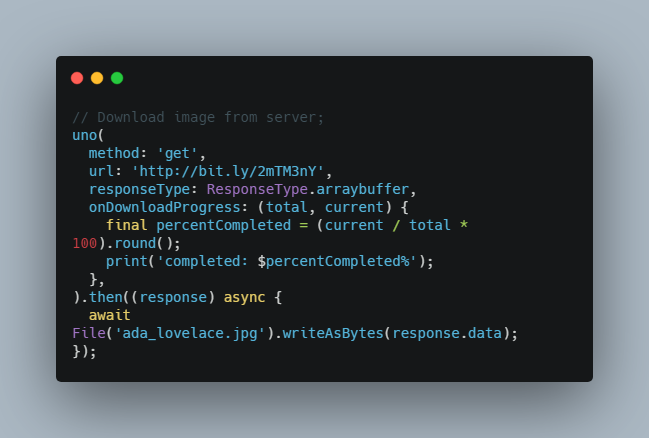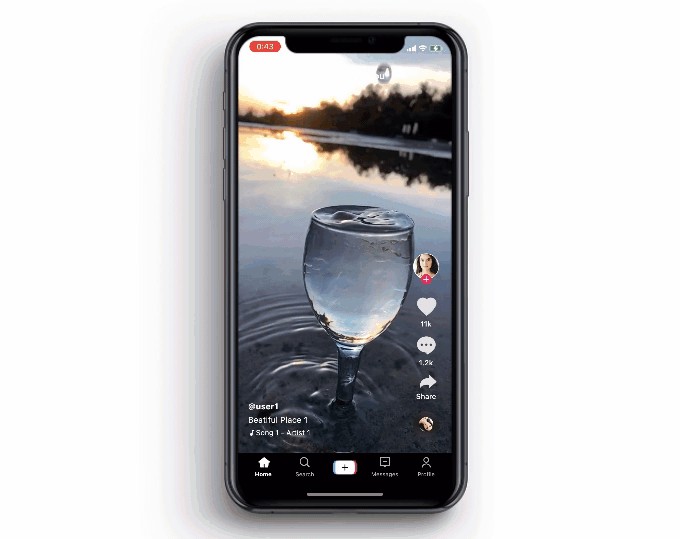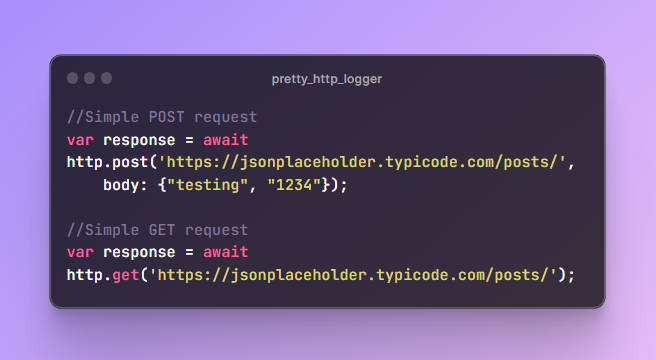Uno
Future based HTTP client for the Dart and Flutter.
Uno, inspired by Axios, bringing a simple and robust experience to the
crossplatform apps in Flutter and server apps in Dart.
Install
Add in your pubspec.yaml:
dependencies:
uno: <last-version>
or use:
dart pub add uno
Usage
Uno is ready for the REST. Methods like GET, POST, PUT, PATCH, DELETE are welcome here!
Performing a GET request:
final uno = Uno();
// Make a request for a user with a given ID
uno.get('/users?id=1').then((response){
print(response.data); // it's a Map<String, dynamic>.
}).catchError((error){
print(error) // It's a UnoError.
});
// Optionally the request above could also be done as
uno.get('/users',params: {
'id': '1',
}).then((response){
print(response.data);
});
// Want to use async/await? Add the `async` keyword to your outer function/method.
Future<void> getUser() async {
try {
final response = await uno.get('/user?ID=12345');
print(response.data;
} on UnoError catch (error) {
print(error);
}
}
Performing a POST request:
uno.post('/user', data: {
'firstName': 'Fred',
'lastName': 'Flintstone'
})
.then((response) {
print(response);
})
.catchError((error) {
print(error);
});
uno API
Requests can be made by passing the relevant config to uno.
// Send a POST request
uno(
method: 'post',
url: '/user/12345',
data: {
firstName: 'Fred',
lastName: 'Flintstone'
},
);
// Download image from server;
uno(
method: 'get',
url: 'http://bit.ly/2mTM3nY',
responseType: ResponseType.arraybuffer,
onDownloadProgress: (total, current) {
final percentCompleted = (current / total * 100).round();
print('completed: $percentCompleted%');
},
).then((response) async {
await File('ada_lovelace.jpg').writeAsBytes(response.data);
});
Creating an instance
final uno = Uno(
baseURL: 'https://some-domain.com/api/',
timeout: Duration(second: 30),
headers: {'X-Custom-Header': 'foobar'}
);
Interceptors
You can intercept requests or responses before they are handled by then or catch:
// Add a request interceptor
uno.interceptors.request.use((request) {
// Do something before request is sent
return request;
}, onError: (error) {
// Do something with request error
return error;
});
// Add a response interceptor
uno.interceptors.response.use((response) {
// Any status code that lie within the range of 2xx cause this function to trigger
// Do something with response data
return response;
}, onError: (error) {
// Any status codes that falls outside the range of 2xx cause this function to trigger
// Do something with response error
return error;
});
If you need to remove an interceptor later you can.
final myInterceptor = uno.interceptors.request.use((request) {/*...*/});
uno.interceptors.request.eject(myInterceptor);
If you want to execute a particular interceptor based on a runtime check, you can add a runWhen function to the options object. The interceptor will not be executed if and only if the return of runWhen is false. The function will be called with the config object (don't forget that you can bind your own arguments to it as well.) This can be handy when you have an asynchronous request interceptor that only needs to run at certain times.
bool onGetCall(request) {
return request.method == 'get';
}
uno.interceptors.request.use((request) {
request.headers['test'] = 'special get headers';
return request;
}, runWhen: onGetCall);
Handling Errors
uno.get('/user/12345')
.catchError((error) {
if (error.response) {
// The request was made and the server responded with a status code
// that falls out of the range of 2xx
print(error.response.data);
print(error.response.status);
print(error.response.headers);
} else if (error.request) {
// The request was made but no response was received
// `error.request` is an instance of XMLHttpRequest in the browser and an instance of
// http.ClientRequest in node.js
print(error.request);
} else {
// Something happened in setting up the request that triggered an Error
print('Error ${error.message}');
}
});
Using the validateStatus config option, you can define HTTP code(s) that should throw an error.
axios.get('/user/12345', {
validateStatus: (status) {
return status < 500; // Resolve only if the status code is less than 500
}
});
Multipart/FormData
You can use the form-data:
final form = FormData();
form.add('my_field', 'my value');
form.addBytes('my_buffer', <int>[]);
form.addFile('my_file', 'my_file.pdf');
uno.post('https://example.com', data: form);
Features and bugs
Please file feature requests and bugs at the issue tracker.




